Arrrr, those pesky pirates! You know the sort; nasty, violent, GREEDY? Take what they want, arrrr, and care not one whit for the contentment of the many, nor even of the few wealthy owners, nor even for that super royal family to whom tax is most certainly due.
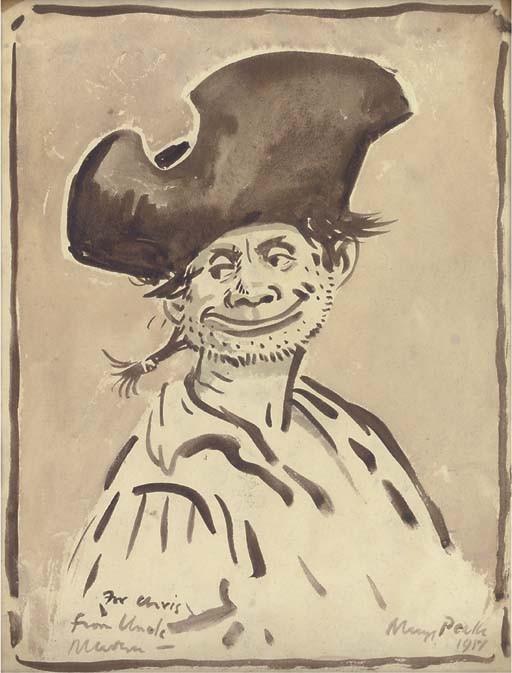
Peake pirate from https://i.pinimg.com/originals/ce/f1/86/cef186f038796cc4d647be6035063f1f.jpg
Queen Elizabeth I (arrrr) knew all about pirates and she didn’t like them. She’d seen too many ships disappear, together with her income, and she wanted the pestilence fixed. Looking toward the Continent, she could tell Jersey and Guernsey were populated and policed enough, but Sark, a teeny island, a craggy outcrop of rock, drilled through by the sea until it resembled Swiss cheese, was trouble. Sark, even now holding the honour of the most caves of the Channel Islands, was riddled with pirates.
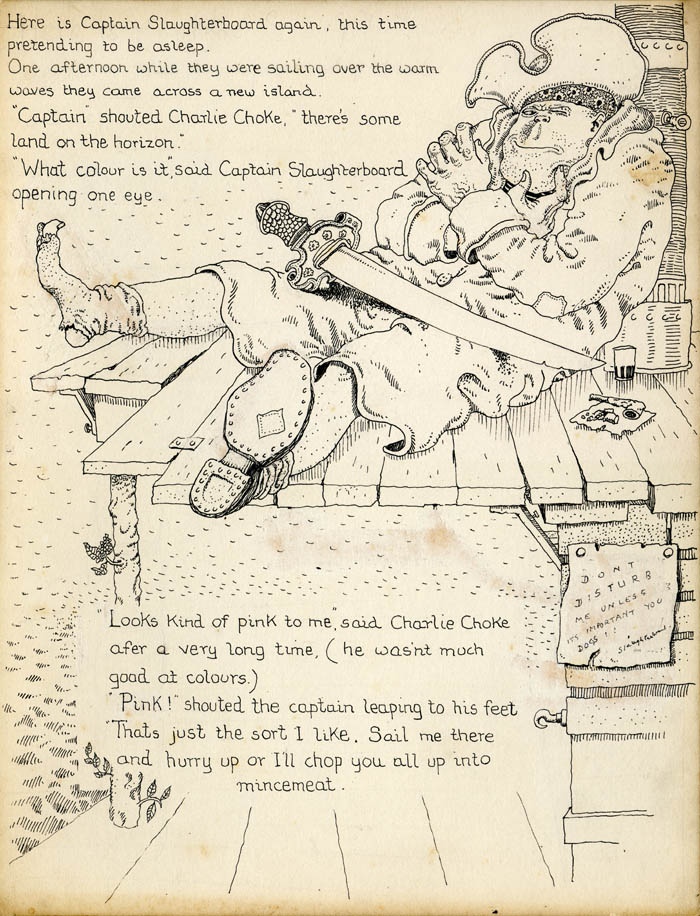
Peake’s first published work was Captain Slaughterboard, written and illustrated by Mervyn himself
Queen Liz wanted Sark cleaned up. She gave the entire island of 4.5 square miles (Sark 2017 Official Map) to a Lord, The Seigneur, and charged him with protecting her waters and getting rid of the blasted bandits.
The Seigneur, in his turn, allowed thirty-nine of his closest armed friends to rent a cheap piece of Sark so long as they kept guard. All they had to do was keep it free of pirates and enjoy the sort of dreamy rural existence made romantic by HE Bates. It can’t have been easy, I’m sure. The early settlers might even have had trouble finding topsoil on that windy place. But they soon found enough to grow sheep, vegetables and send their children off to fee-paying English schools and eat delicious French food. They invented lazy summer holidays and horse-drawn tourist peace and all was well.
https://www.youtube.com/watch?time_continue=4&v=0yCccWcFbXw
After a few hundred years came World Wars and German invasion. This was difficult but eventually the locals overcame the barbed wire and life went on in the same idyllic manner. But, what if, after 450 years of dutiful protection, the locals became complacent? What if they forgot their obligations to the crown and their duty to protect Sark? What if modern pirates began circling the island in their helicopters with their fancy new technologies? What would happen if the Sarkese didn’t realise they were under attack until it was too late?

Peake apparently knew Treasure Island by heart http://fantasy.glasgow.ac.uk/wp-content/uploads/2017/01/ea29c77f532850e2945dc298b35da651.jpg
I was awarded the Titus Groan trilogy for debating at a small girls’ school in Dunedin, New Zealand. Even when staring at the pencil illustrations on the covers, I knew I’d been handed the key to another world.

http://mervynpeake.blogspot.com.es/2011/05/illustrated-gormenghast-anticipation.html
The Gormenghast books were satire, adventure and a description of enclosed society. Mervyn Peake, artist and writer (as much as those two roles can be separate in his life) conceived and wrote much of the trilogy when Peake and his family lived on Sark. Much has been written about his childhood in China and how that experience might have contributed to the strangeness of his creation, but having visited Sark, I think that’s where he found the core of Gormenghast.
The Peakes moved to Sark in 1946 and lived an arcadian lifestyle for three years as he planned the series. As a single man he had lived on Sark for four years before the war, in an artist’s colony. He was an eccentric fellow with a pet cormorant and a penchant for nudism. He became an art teacher and a war artist later.
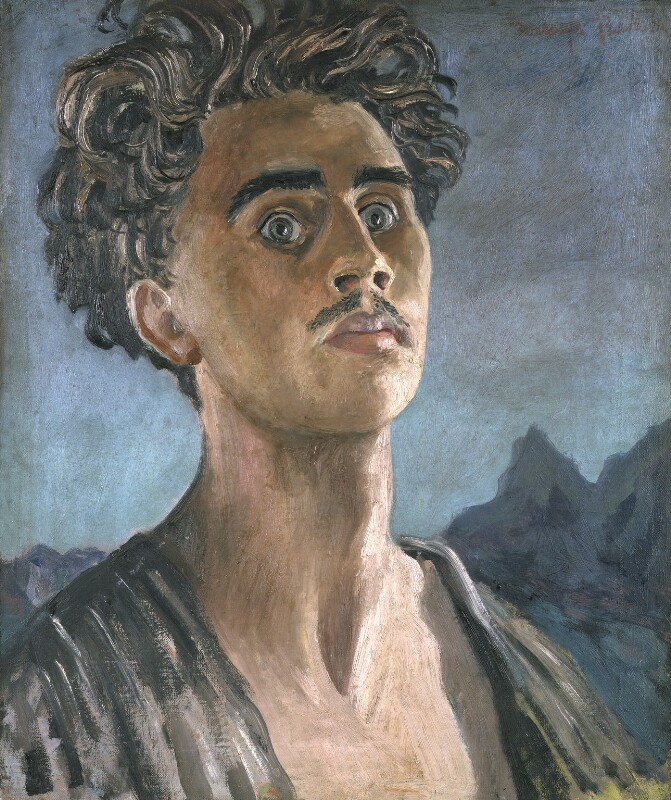
https://www.npg.org.uk/collections/search/portrait/mw07779/Mervyn-Laurence-Peake
Seventy years on, I went to Sark in search of Peake, hoping to find evidence of his inspiration. He was the first world builder I’d ever encountered, in words or pictures.
“My voice has all the lushness
of what I can’t abideAnd yet it has a beauty
most proud and terrible
denied to those whose duty
is to be cerebral.”
To me, Peake was more than a friend. He was a soulmate.
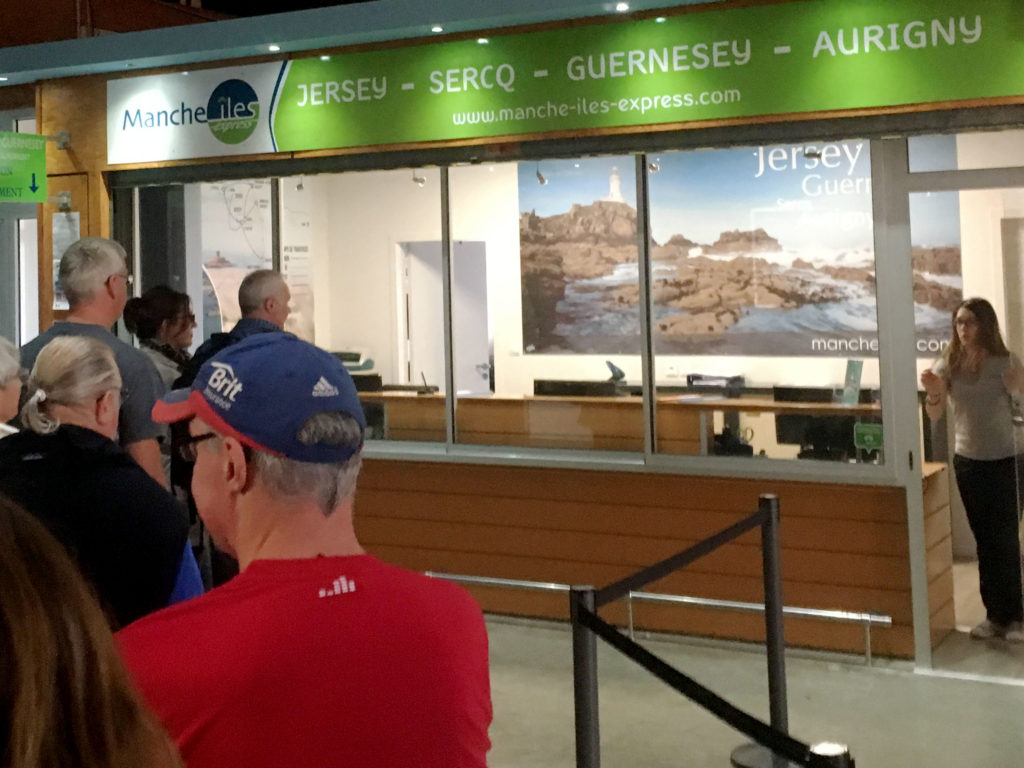
Waiting to buy tickets for the ferry at Granville
To get to Sark, one must travel by sea. Port de Granville of France was not colourful. The buildings were grey, beige or cream or a clotted mix and the sea was slate grey. The sky was filled with ashen clouds. The boats were once white with an odd faded blue for contrast. As I waited for the ferry I watched the floating world go by. As the ferry prepared to leave, I watched two men and a clump of fishing rods bump out of the protection of stone walls in a surprising bright yellow inflatable.

This is not the ferry. A fellow traveller.
It’s difficult to imagine how those old sea walls could possibly have been built without the aid of cranes and heavy engineering equipment. I suppose each wall, built on the remains of the previous, becomes stronger over the ages, like nearby Mont Saint-Michel, a dramatic medieval castle-cathedral, which may also have influenced Peake.
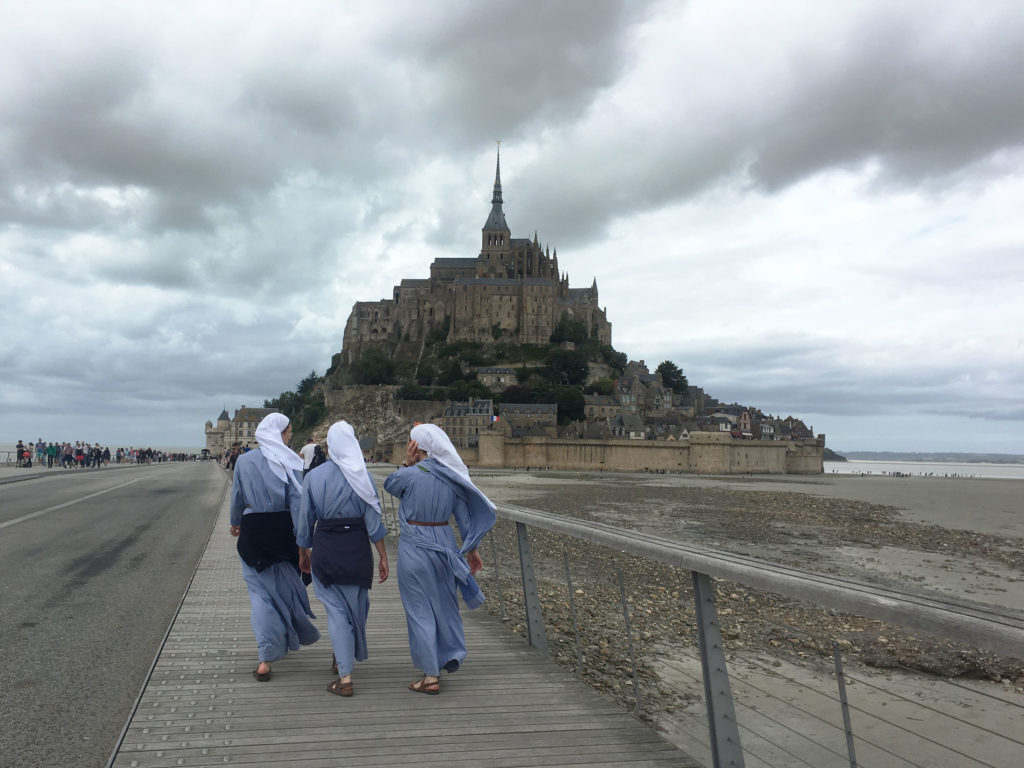
Mont St Michel
Au revoir La France! A bientôt!
From Granville we sailed to Jersey. “In Transit” whilst at Jersey meant walking off the boat, waiting for customs to look at the passport, getting a new boarding pass, walking to the waiting room and, without sitting down, getting in the queue to return with treble the amount of people wanting to visit Sark. In less than an hour we were on our way again, past a proud fort crouched on the Jersey coast fringed with cranes poised this way and that. Jersey, as far as I could tell, was an island plagued with developers.
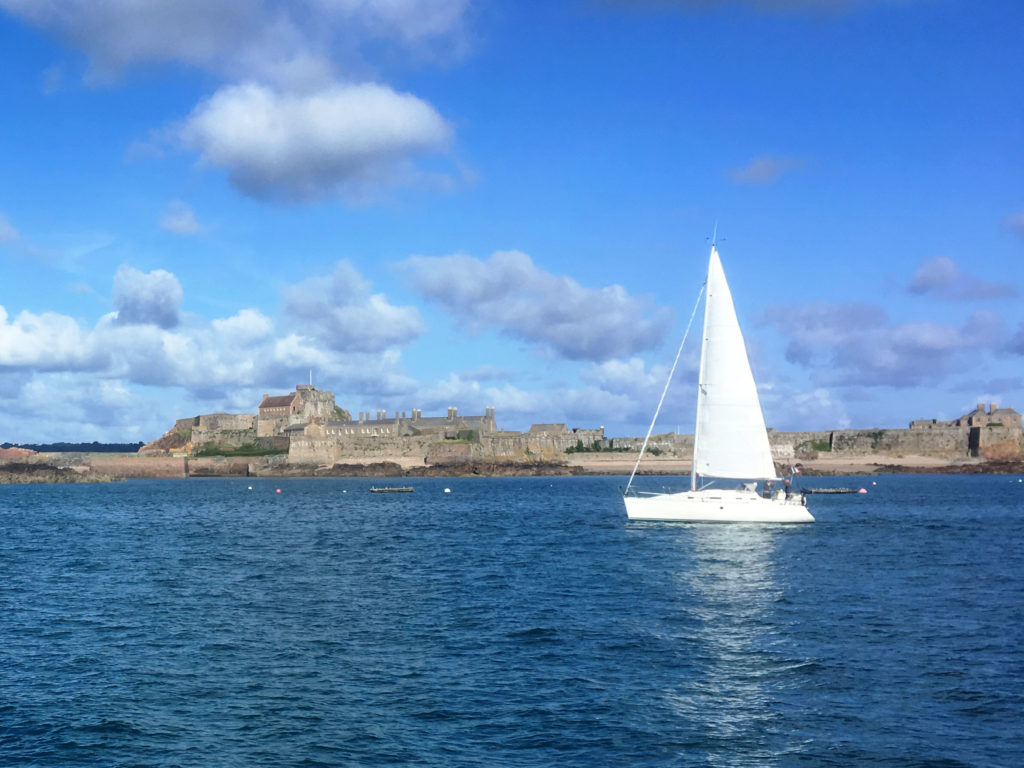
Jersey fort
On board the ferry, I stood on deck, leaning into a bend in the rail, loving the rise and fall, the spray from the ploughed waves stinging my face. The wind was icey but there was warm sun on my back and soon enough we neared Sark waters. Rocky waters. Great dark craggy outcrops jagged from the white water all around the cliffs. A black tidal mark or plimsoll line bruised the rocks just above the water where the waves have engraved a thinner waist for the island.
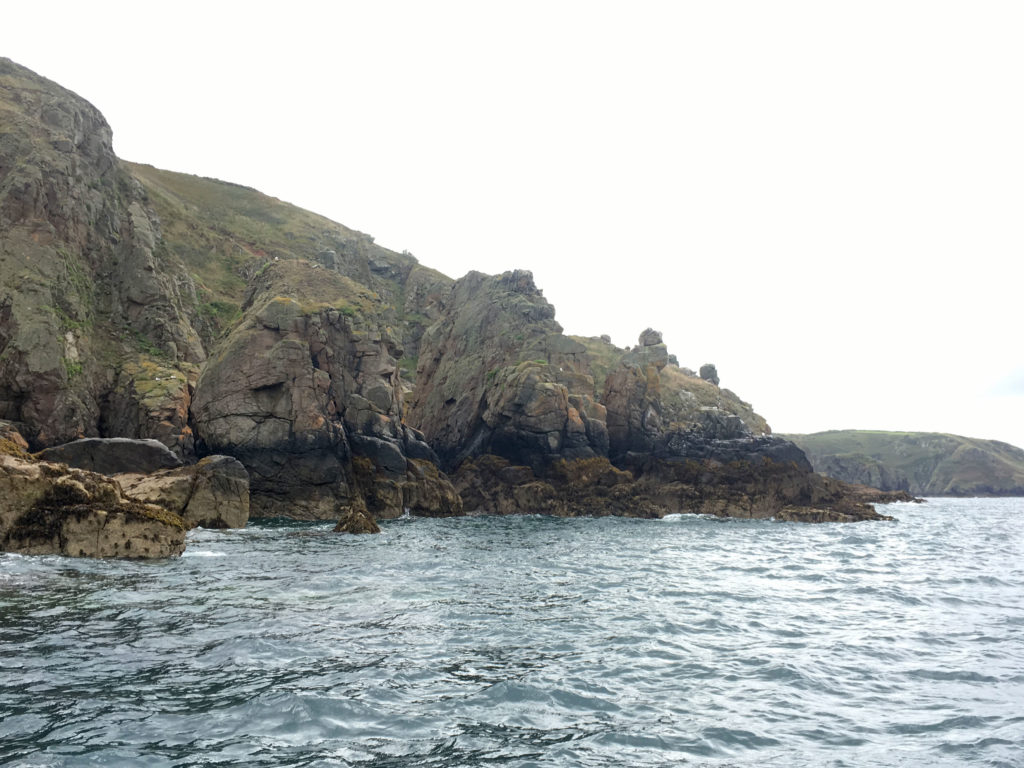
Black lichen high water mark around Sark
Extraordinary harbour walls featured steep steps up to a road, which wound through a tunnel in the cliff. I found it difficult to imagine the grasping hands and burning backs, tearing muscles and broken legs; the vision and the technology that had to be utilised to build these sea walls.

Maseline is the main harbour of Sark, where the ferry and the mail boat visit – and not every day. The weather conditions are extreme. The sailors must be very skilled indeed to negotiate their paying customers up and down the steep steps to the ferry.
I puzzled, how could those early tenants have tamed the fierce thundering waters long enough to build towering stone walls right into it?
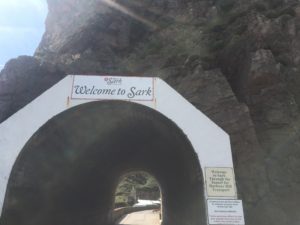
Welcome to Sark
There, through that proscenium cliff archway, was a walk up the hill. You could catch a tractor ride if you preferred but I chose the lovely green twisty path, and on, straight up the dusty thin carless road to the Sark Visitor’s Centre.
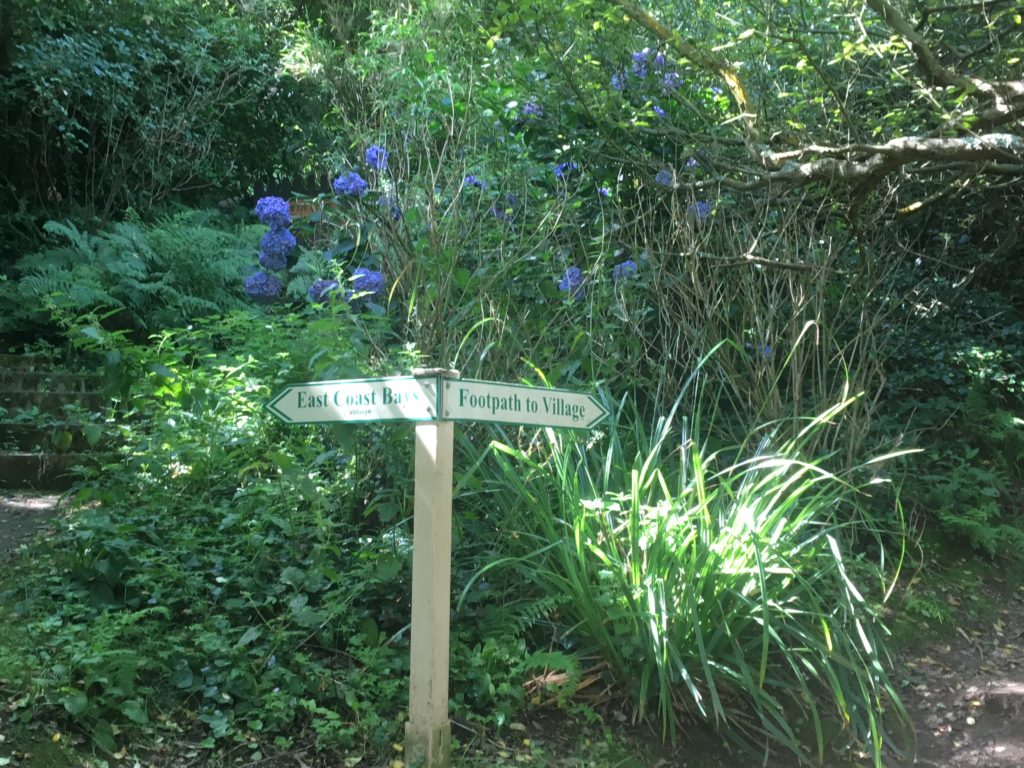
Leading us up the Sark garden path
My first impression of Sark town centre was ‘English Country Garden’. It was all very picturesque and human scale, apart from the giant vibrant begonias in all the bridesmaid colours of the world. I had no idea they could grow that big!
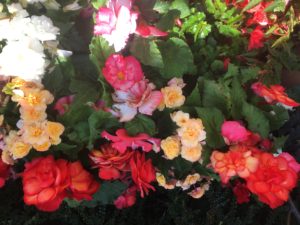
Over-sized begonias in the Sark garden experience
Sark seemed almost too good to be true.
The information officer told me that not many people come to Sark to seek Peake. What? REALLY?! The only reason I came was Peake. What else could there possibly be?
On the way up the main road it was difficult to ignore the amount of shops for rent and closed businesses. One entire side of the street was empty. Shut. This was peak tourist season – the middle of summer – August. The information woman told me crossly it was because of the cost of electricity. Far too high. (And not one solar panel in sight.)
I trooped off to La Vallete Campsite (a couple of paddocks on the cliff edge of a farm) where I put up my borrowed tent. When I fronted at the campsite ‘office’, more a mud-room entry space really, Linda said she found all her emails blurred into one – which camper was I? What did I want? Exactly? Just a place to lay my weary head.
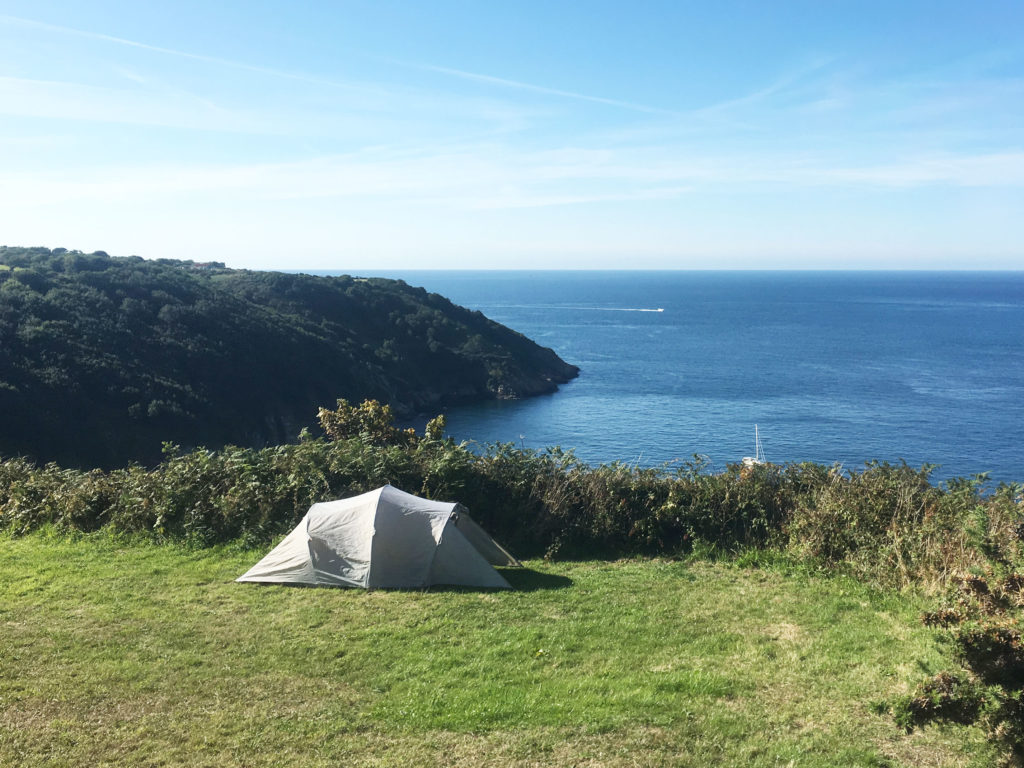
Incredibly grateful that Roseann, Olivier and Mike lent me their tent!
I was unused to camping, unprepared and unskilled. I chose a site close to the edge of the cliff, though fenced in on two sides with blackberries. It appeared someone had desecrated the corner with some toilet paper streamers. They had been rained on. I tucked them back into the blackberry bush with the tent-peg mallet, of which there were several on offer. I put the small end of the tent into the prevailing wind but who knew where the wind would blow next?
There were a few puffy clouds looking thoughtful and attractive about this intense blue sky while the sun beat down meaningfully. Several charming yachts were drifting below, parked in La Grève de la Ville like a school of tethered white and blue tuna.
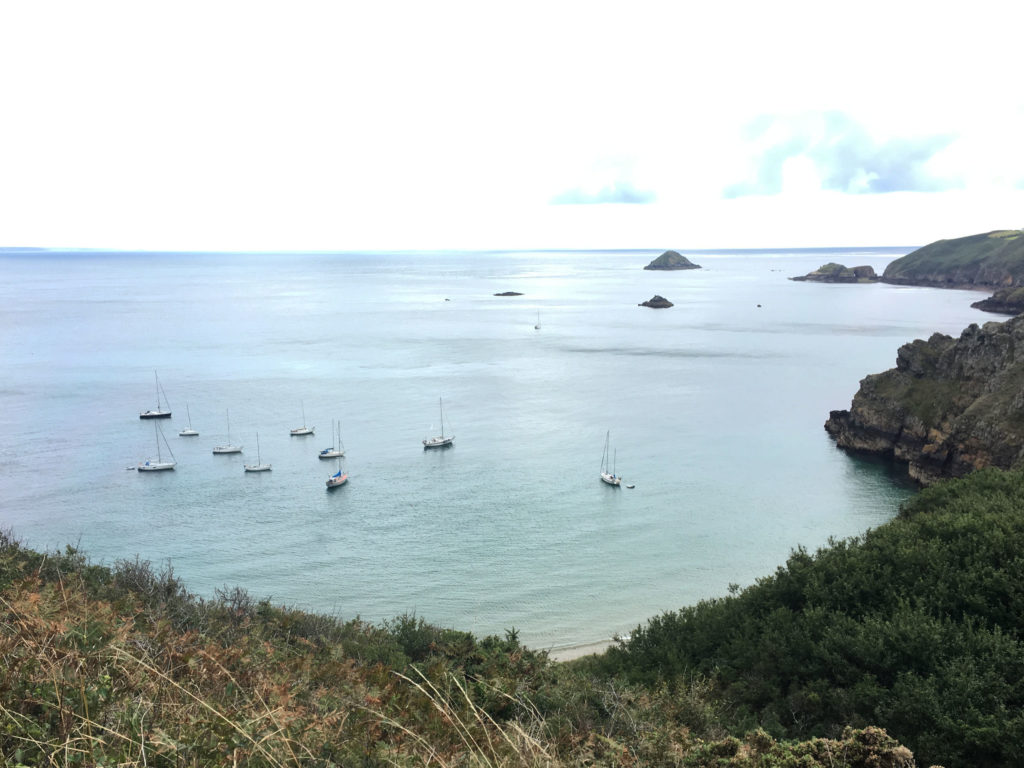
What sort of pirates sail the high seas?
What to do next? Obviously I had to go to the Vicar’s Fête, one of the Sark calendar highlights. Apparently the Peake family had lived nearby in a housed called Le Chalet. While I struggled to decide what book to buy at the bookstall (couldn’t) the auction began. I assumed the auctioneer was none other than the vicar himself and he proceeded to give a progress report of the Fair. There was a loud cry of despair from two women next to me when they heard there were no cakes left. A chap muttered to the bookseller, ‘Well, I’m not surprised. There weren’t many to start with.’ Suddenly I looked left and right. Was I in an episode of Midsummer Murders? The all white and cashmere Vicarage workers were certainly over fifty years old (many harking back fondly to their seventieth birthday). A small gang of vaguely Gothic teens/early twenties lounged on the grass to prove the exception.

The Bank. Summer outfit.
As I left the Fête, I noted a few summer visitors – I suspect you wouldn’t get called tourists – harrying their children around on bicycles. Because there’s no cars and you can easily hear a tractor on the way, or one of the horse-drawn carts, children hoon about freely.
Up by the path to the lighthouse (now an Airbnb with no public access) I found a well-placed bench overlooking the yachts to my left and several rugged rock islets scattered over the waters to my right. The waves were rustling below, tickling the shore. I could hear seagulls crying out somewhere and behind me in the bush grasshoppers (or crickets) sang a high-pitch bed of noise.
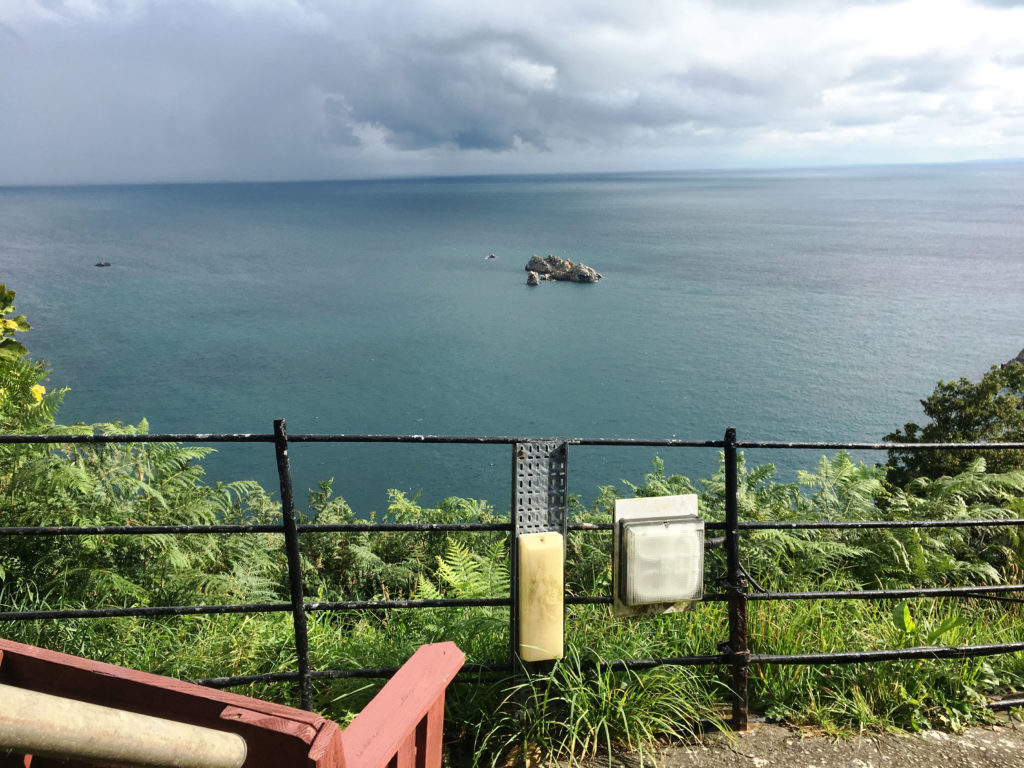
With lighthouse to the right and La Grève de la Ville to the right, my dinner bench was a peaceful spot
As I ate my dinner I watched currents moving under the water. The current coming around to the right (towards Maseline Harbour) was smooth, in contrast to choppy scuff marks sweeping the current along. It was as though someone had come through with a big wooden spoon and made a curvy pattern across my sea view. A speedboat ripped across the water. Dark navy depths rejoined as the white zipline faded away. The water then had a nap, brushed wrong way in a pleasing curve around me and smoothed further out like a rainbow arc but all tones of navy stripes. Then came a flotilla of small jet boats – possibly fisher folk returning for their dinner? Possibly cocaine smugglers for cocktail hour?

Les Fontaines where there are definitely smugglers caves just out of frame
The next morning I skittered down steep stairs to La Fontaine Bay, a sheltered and rocky smuggler’s cove where the sun blasted down. A seagull in the distance tangled with a plane far too high, altogether there were far too many planes roaring overhead. There were two great caves on the opposite side of the bay. I thought the tide was out because the seaweed was still fresh wet on the rocks. I thought of Peake, and Titus, as he might have walked these rocks and pathways, and how the woman in the tourist information office said, ‘Well, he’s not everyone’s cup of tea, is he.’

A local grandfather made the Epeguerie rock pool many years ago. It’s leaking now. And, look, there’s George’s boat taking a load of tourists around the island!
I spent a good part of the day in my togs staring in a rockpool instead. The rock pools were heaving with little fish. When I assumed the gazing position, rubbernecking into the shallow twinkles, two fish came to look at me as if they were watching telly. They watched me watching them. Another swam through. Quickly. Then another. One of the watchers changed position, coming a little closer. They all kept a steady eye on me. A darker one took shelter on an outcrop, just under the surface. As a fragile cluster of guppy things swam by, the dark one up above slapped the water somehow, making a surprising snappy clapping. I took up various positions around this Grandpa-made pool, leaking slightly now, but still absorbing viewing.
I marched up to the nose of the island, Bec du Nez, where seagulls sit like complacent white crowns on royal lumps of rock, their soft feathers littering the sheep-gnawed grass around them. It’s called the common and the guide suggests counting butterflies. Too many flutter by and I take it the counting is a joke. Mostly quiet brown creatures, perhaps with a spot or a bit of pale and some colourful ones too with flashes of orange and yellow. I mainly walked around the Eperquerie area, eating far too many blackberries. I wanted to get to the historical society in time to enquire about the ruins up there and ask what that black stain is. I took a bit more of a stroll to examine the Buddist carving on a rock. Not sure why it’s there. And then a snooze in the sun.

Perhaps the Buddhist carving is simply for us to ponder while relaxing in the sun or, maybe, it is to protect the island from evil.
When I eventually regained enough strength to eat more blackberries I got back on track and hit town too late for the historic society. Turned off by the Sunflower Café but admired the Sunflower Project, a two acre field donated by the farmer to grow sunflowers and other plants for birds and insects. Very happy to see Shenanigans Café open where a friendly young lady from Cardiff lent me her charger, made me a coffee, and a cherry jam sandwich. They even employed a solar panel or two. All well with the world.
Although impressed by the ancient windmill, I was saddened the bakery was no longer used. In fact, there’s no bakery open at all on the island. Here’s an opportunity for someone to run the place the way it used to be. Or stick up a new windmill to get things cooking. (Could they afford the thousand-pound-a-week plus rent the owners are asking for the bakery on the main road?)
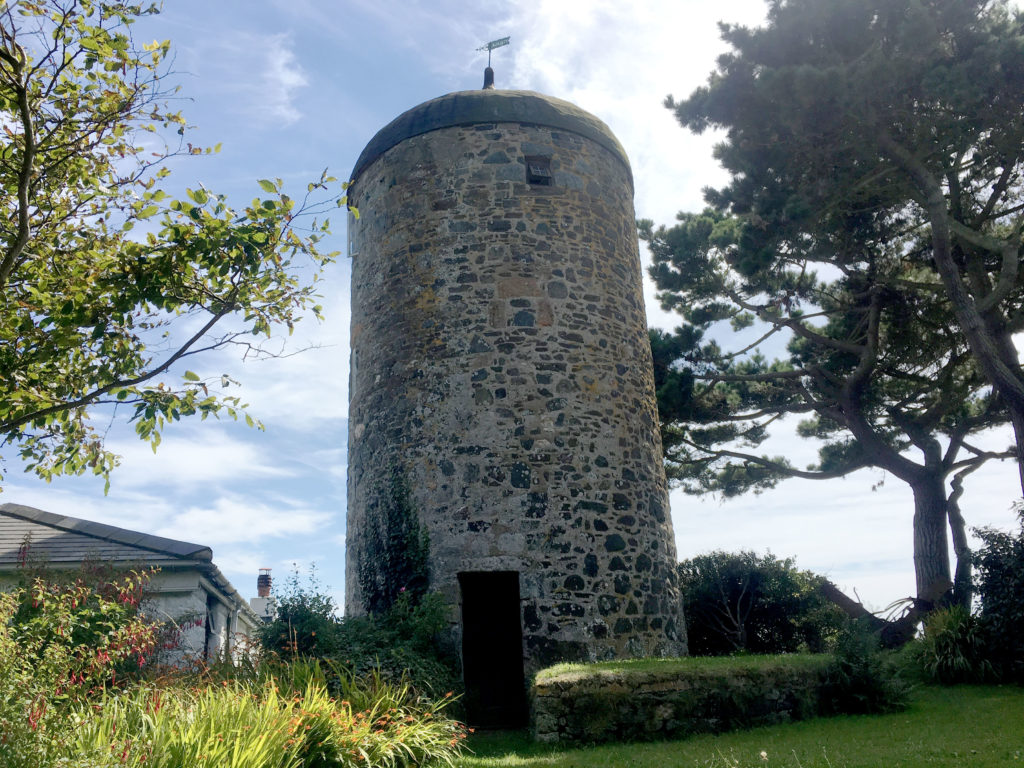
The windmill’s wings are clipped (off)
The next day I woke to the tent flapping briskly in the wind. I had a dream in which I was picked up (while still in the tent) and moved to a hall. In my dream hall, many people were sleeping next to each other. I woke up (in the dream) to find myself between two bickering young men. One stretched out, over me, to annoy the other and I slapped his arm lightly. He was upset but I didn’t care. A young doctor came to look at my prone self. She looked worried. They hadn’t been able to wake me previously. I reassured her that I was in fine fettle. I must have fallen into such a deep sleep because I’d been awake after I thought I’d lost my wallet.
This last bit was true. I wanted to see the famous Dark Sky so when I woke I jumped at the chance to wander over to the toilet block. But I didn’t need a torch. The sky was bright. There was a full glorious moon. As I watched she pulled an elegant cloud-veil across her face. I dreamily went to watch the lighthouse flashing around the bay. This was the sign-posted lighthouse, now closed to the public, certainly a working warning light so that was reassuring. No big boats about to crash into the cliff. When I arrived back to the tent I discovered my wallet missing. Panic. Flashed the torch everywhere it might have been. Raced back to the loo and the lighthouse viewpoint. Started planning survival strategies. Got back to tent, tried to avoid dew soaked tent flap, began sorting and found wallet straightaway. Thank goodness. Asleep immediately to dream the wind picked me up. But it didn’t.
It was all just the wind in the tent.

La Coupée is a very thin and wind vulnerable connection between Sark and Little Sark. Note the droppings left by the most popular form of tourist transport.
The next day I walked over the steep, curving La Coupée, a road built and fenced by prisoners of war, to Little Sark. Believing strongly in discretion above valour, I decided not to climb down to the Venus Pool alone. Looked arduous and I still had time to return to the historical society. If no one hears you scream did you actually fall to your death off a rocky cliff?
At the peak, I lounged on a soft patch of vivid green with tiny stalks bearing little cups of crispy white petals. Sark. Blackberries, sweet as desire. Butterflies, light and mobile as an already forgotten thought.
Sun bore down in full force, sea birds wheeled around and overhead. Many spattered brown birds – herring gulls? No wonder Peake thought of angels when he came to write Mr Pye, his book actually set on Sark. The jagged landscape is covered in fluffy white feathers.
I was so KEEN. Arrived at the historical society office 12:25 with plenty of time before they shut. Popped in to the loo, no potable water there and came to stand in line at the Heritage Room. Or rather, I waited in the corridor. A man held forth to a small elderly lady. She did not see me but I sort of bowed to the gentleman to indicate that I intended to move into the room, was that allowed? He met my gracious greeting with a blank stare I took to be assent so I moved into the space. Glass cabinets and folders of information about Sark surrounded me. I looked up the meadow pippet in birds of Sark, as the meadow pippet is my favourite bird. I think I may have seen a rock pippet near the old mines. I could find, as I slowly perambulated around the room, precisely nothing about Mervyn Peake. Nothing about pirates or the dark plimsoll line.
Meanwhile, the man held forth about the crimes of the British education system. He used to be a headteacher. He despaired at the constant measuring to which children are subjected in the current British system. As does his wife, a sixty percenter, but working full-time. As it turned out, you wouldn’t believe it, he, Richard, came from Wollstonecraft (or somewhere), which is EXACTLY where the thin, elderly lady’s brother and sister-in-law reside. Extraordinary coincidence. After that they spoke about the exhibits in front of them, neolithic axe heads and other items of geological interest. I believe he may now be a geologist of some sort. They were getting on splendidly and I’d perused the flowers of Sark and the rocks of Sark and the moths of Sark and the interesting beads, possibly made from Baltic amber found around Sark, when I realised these two had just begun to warm up. I took my departure (unnoticed) and headed to the Post Office where I intended to buy and post postcards. And there, at last, in The Gallery Stores and Post Office, I found Mervyn Peake and his creations.
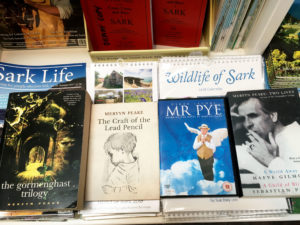
All the Peake Offerings in the Sark Post Office and Gallery
After dealing with postcards I went back to request the nearest potable water tap at tourist information. While I waited I looked through a beautiful coffee table book, ‘Art for the Love of Sark’. This is the record of an inspirational visit to Sark by twenty artists from Artists For Nature (http://www.artistsfornature.com/projects/sark/) It is a remarkable venture and I urge you to peruse the website and buy the book, if you can. One of the artist members, Rosie Guille, runs a delightful little gallery on the main street of Sark where you can pick up the book, perhaps one of her own evocative paintings or practice the art yourself. Here is her online gallery: https://rosanneguilleart.com/

http://www.sark.co.uk/958-958/
Back in the Sark Visitor Centre, the kind officer offered me the still warm water from her kettle. She preferred to boil the bore water. They have a good water table. Don’t need to go down too far. I remarked upon the lack of visible water tanks and that bore water is, of course, finite. She felt not. A good water table is a water table for good. I continued in my strident, visitor knows best sort of way, surely that’s the problem in California? She said, ‘Sark gets more rain than California.’ I said, ‘Isn’t that a good reason for water tanks?’
Didn’t seem like a smooth conversation did it, so I bought up Mervyn again. I wouldn’t let him go, I just couldn’t, and I said what a shame it was there was no shrine to this great writer. She said, ‘There’s a lot of artists that came from Sark. They couldn’t possibly commemorate them all.’
I said, ‘Like who?’ She said, ‘Cheeseplate and Topless’, people I hadn’t heard of so I added, ‘Oh yeah,’ I muttered dismissively, ‘And let’s not forget Victor Hugo!’
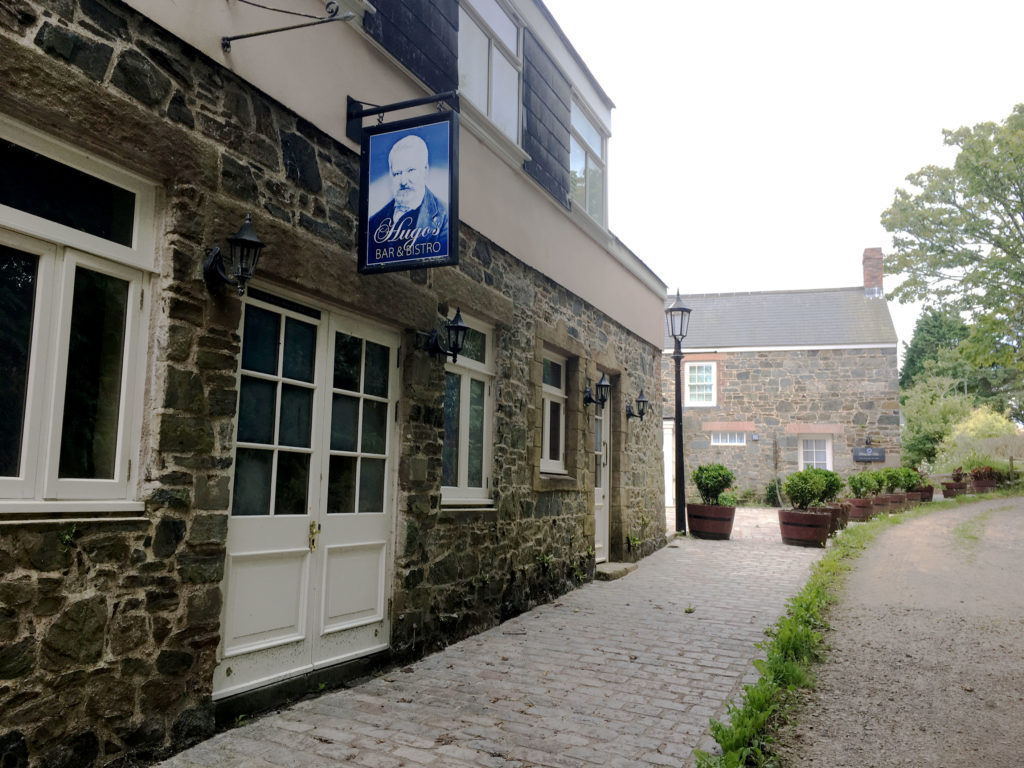
One of the closed hotels features a bar honouring Victor Hugo
Wasn’t it amazing that Victor Hugo had only been on the island for two weeks and he had a cave and a bar named after him while Peake had lived here for seven years? ‘Oh, she said, ‘Hugo was here longer than that.’ I said, ‘Not according to the pamphlet over there … ‘ And she looked askance at me.
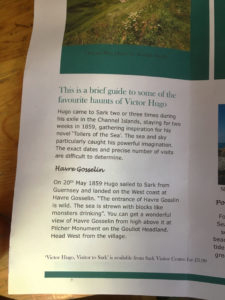
Well, they hedge their bets, don’t they …
In order to lighten the atmosphere I added that I had started to see Gormenghast as a satire about Sark itself, what with all that inherited fifedom, and the enclosed nature of the island. She hadn’t read it but agreed that although many people had wanted democracy in 2008, many had wanted the island to stay the way it was. Is that so? To swing it all back to Mr Peake and his glory, I said it was a shame there was nothing available in the tourist information shop about him and she said, ‘Perhaps there’s nothing of his available to sell?’ And I said, ‘Well, there is in the Post Office!’
After a desperate pause in which we both wanted to be polite, she said, ‘Did you know he used to live there?’ And I said, ‘No, really?’ (Which was a lie because I did know by then) and she said, ‘Before it was the Post Office, of course. They had some pictures up once, showing him painting there.’ After making all the correct admiring sounds I said, ‘I had heard when he first lived here, when he was freezing in a barn, he worked in the fields to get money and had a pet cormorant.’ She looked askance again, ‘Well, you know better than I do, for sure.’
So I said that she was lucky to have the books to look forward to, that they were wonderful and thanks for the water. I could have reminded her that the books were all available in the PO but you know, I’m proud of myself. I knew when to stop.
There was the dead bakery on the main road. CLOSED. Another shop on the main street, CLOSED. Then, on the way to Dixcart Bay, a great swimming bay, I passed a large fancy hotel. CLOSED. What was going on? Time for some research.
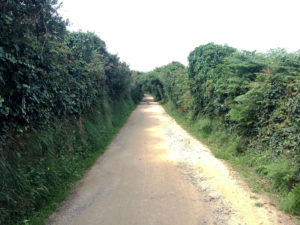
Sark, straight ahead?
The price of electricity has little to do with the price of politics in Sark. Turns out Sark does have a darker side. Sark really is too good to be true.
Under all those pots of petunias, pretty tree-lined laneways and those quaint seventeenth century stone buildings lies a squawling ten-year-old democracy, fighting a 450 year-old-fifedom. Or is it?
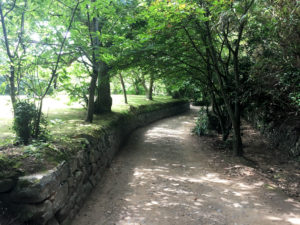
Shady laneway in Sark – around the bend?
The democracy was apparently born of twin media barons, David and Frederick Barclay, trying to buy their way into tax-free law-making power. Come on. Did Mervyn Peake write that stuff? (NB: There were twins in the drama of Gormenghast but they were victims. Cora and Clarice were killed by Steerpike, a young man thirsting for power.)
Peake certainly loved pirates as described by Rob Maslen in a fine blog post but I don’t think Mervyn would much care for these boys. The Barclay Brothers have caused a sort of disease, a kind of cancer, in the form of untended grapevines, empty hotels and falling down buildings holding up the land.

Vines in apparent summer disrepair
I really felt at home in Sark but what a beastly thing this duo of billionaires have done. They’ve bought a good percentage of the ancient tenements but have not yet managed to sway the democratic elections enough to get their chosen people in power to make the legal changes they require. They want to make their bit of the island a separate tax haven. They normally live in Monaco but they’ve built a showy castle on a their private mini-island called Brecqhou.
https://www.youtube.com/watch?v=81spGYC1al4
They’ve installed a helipad and roads and landed cars – against the rules, nay ethos, of Sark. They own all the empty shops and most of the main island’s hotels; those now standing empty. So there’s no work in those CLOSED hotels and no paying visitors. Which means the population of the island was half its normal summer number last year.
You can watch a Panorama episode available on You Tube that explains how these two media moguls have been trying to play monopoly and throw the board over when things aren’t going the way they like. (I’ve seen my sister do it. Definitely a thing.)
The next morning was cloudy. I eyed the tumbling impending rain clouds suspiciously as I rushed to finish my breakfast before it came down again. I managed to bring everything over to the shed where there was a sort of veranda. I stretched the tent out over the ground and sipped my coffee while weak shards of sun stroked the damp nylon into submission.
Once I figured everything would not rot away if rolled up, I packed and left the stuff ready for the appointed pick up. I managed to walk the delightful garden dell path to the harbour five times that day. Once, when the friendly bank ladies thought George wouldn’t go out in this weather and I imagined I’d better take a look at this enclosed bay, Creux Harbour, to see how small and cute it really was, and how the water smashed up through the stairway.
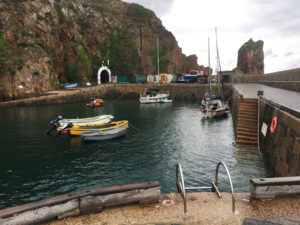
While waiting for the Non Pareil to arrive I strolled around the picturesque Creux Harbour
I strode back up to find a phone which just ate my money and refused to connect with anyone. Luckily I ran into Rosie rather than have to face the Information Officers again. She put in a call to George for me and we were in business. Back down the windy path I went. On the way past, I couldn’t help myself, I popped into the smart corporate looking real estate company office. The smartly-attired business woman at the desk agreed there were a lot of closed shops on the main road and, yes, it was a shame.
I mentioned I came from Australia and there was an interesting phenomenon, started in Newcastle a few years back, called ‘Renew‘. The idea was that local officials would make empty, run-down shops or premises available to artists and small desktop computer type start-up businesses for peppercorn rents in order to bring life back into blighted areas. There was quite a lot available on the internet about it, I pressed on, Renew had been a great success. She agreed wholeheartedly, making no move to search her computer. She pretended to take a note in her diary and promised faithfully the Chamber of Commerce would be discussing it at the very next meeting.
I marched back down again and found the eighty-year old George and his son, Morgan, waiting in a jolly little boat, the Non Pareil. They took us from hightide Creux harbour, round the island with the most caves in the channel (Sark, remember?) and back to a low tide harbour. Here could be a clue for a renewable energy source – tidal power must surely be an option on Sark. Watch Morgan move the Non Pareil quick smart out of there!
George had met Mervyn Peake. He reported he was a very nice man. And George’d been in the tv series, Mr Pye, too. In fact nearly everyone on Sark had been involved!

Low tide at Creux Harbour reveals how those harbour walls might have been built!
When we went past the castle, George spoke unenthusiastically about the lack of community spirit of the Barclay boys.

George and his son Morgan take the tourists around Sark in all the weathers
These modern pirates, the Baron Boys – Barclaydum and Barclaydee – came in helicopters, spread fake news that makes German propaganda look like nursery rhymes and when they didn’t like the way their game of Monopoly was heading, they threw the board over so no one could finish the game. They made several families, true descendants of that first Seigneur, the friend of Elizabeth I, walk the financial plank. They bought up houses, hotels and disgraced the local Doctor Kindness himself.
The sad thing is that this isn’t a draft of the fourth (or fifth) Gormenghast book. This is life on Sark today. Unless the Royals, who happen against all reason, to be good buddies with the Barclay Media Barons – those very same Media Barons relishing once-private information about royals, celebrities and other saucy scandals – unless Prince Charles – whose architect pal built the pseudo castle on BB island with, I kid you not, real canons balanced on ramparts artlessly covered in Spanish stone, unless the Crown can come to Sark’s rescue somehow, it’s difficult to see how this stalemate will end. The Pirate Twins themselves are now old men kept alive by the wonders of modern medicine. What of their heirs? What will become of Sark in the long run?
If the parliament or the Lord (Seigneur) could somehow regain control of the tenements belonging to the main island, I wondered if it might be possible to let the Barclay Barons have Brecqhou Island on a long-term lease? Surely they did not sell the land freehold? If the community could retrieve the hotels and shops on the mainland, they could get their own economy functioning once more.
Sark’s situation put me in mind of another David and Goliath story, that of Cuba. There was a thrown monopoly board if ever there was one. In my humble opinion Sark urgently needs to bring in permaculture experts, as they did there (Power of Community: How Cuba survived peak oil) particularly those knowledgeable about burning rubbish and making renewable energy. The stench of foul smoke overhanging the harbour is awful. Sark clearly has wind potential, and the tidal variation is powerful. Sark could surely become self-sufficient in energy one day.
Is it possible the Barclay Twins, their heirs and the Royals could join the community to build such a forward-looking and clean energy exemplar for the British protected Channel Islands?
My dream? Where I was picked up by the wind? Have I been asleep all this time?